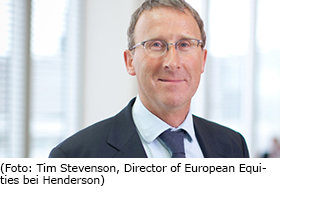
Janus Henderson: Where now for Merkel?
Germany coalition talks failed. So it is back to the drawing board, but one where there are now no guidelines as to how things may pan out from here. There are a number of alternatives. Germany has a tradition of pragmatism in politics and I expect some kind of agreement to happen over the next few weeks, so Tim Stevenson, Director of European Equities.
23.11.2017 | 13:47 Uhr
 Having fared worse than expected in the September elections in Germany, incumbent Chancellor Angela Merkel was expected to be able to form a so-called ‘Jamaica’ coalition (named because the parties’ combined colours resemble those of the Jamaican flag) between her Christian Democratic Union (CDU) party, its sister party (the Christian Social Union), the Free Democratic Party (FDP) and the Greens. However, after more than a month of wrangling, the FDP party, which only recently returned to the Bundestag – having previously slipped below the 5% minimum threshold – has pulled out of talks.
Having fared worse than expected in the September elections in Germany, incumbent Chancellor Angela Merkel was expected to be able to form a so-called ‘Jamaica’ coalition (named because the parties’ combined colours resemble those of the Jamaican flag) between her Christian Democratic Union (CDU) party, its sister party (the Christian Social Union), the Free Democratic Party (FDP) and the Greens. However, after more than a month of wrangling, the FDP party, which only recently returned to the Bundestag – having previously slipped below the 5% minimum threshold – has pulled out of talks.
So it is back to the drawing board, but one where there are now no guidelines as to how things may pan out from here. There are a number of alternatives, such as renewed elections (perhaps in April 2018), or a minority government handling issues as they come up, or even an unexpected repeat of the previous ‘Grand Coalition’ with the Social Democratic Party of Germany (SPD). However, for the latter to happen, the SPD would have to explain why it has retreated from a previous statement that it would not form a coalition with the CDU, after their worst election results in the post-war era.
Nonetheless, the pressure is great from both German President Wolfgang Frank-Walter Steinmeier and highly respected and experienced politicians such as former Finance Minister Wolfgang Schäuble, to compromise and form a working coalition. Germany has a tradition of pragmatism in politics and I expect some kind of agreement to happen over the next few weeks. Angela Merkel also remains highly respected, both within and outside Germany, and I believe that she will retain her position as Chancellor.
In the meantime, the German government continues to function as before the election, so it is unlikely that we will see any significantly negative impact on the economy. But the direction of travel is clear; whatever kind of coalition is formed in Germany, there must be progress on the issues that led to political gains for the AfD (Alternative für Deutschland), Marine Le Pen in France and Geert Wilders in the Netherlands.



Diesen Beitrag teilen: